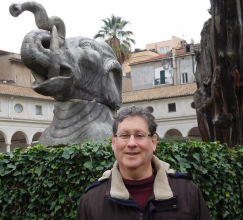Gabriella Coleman
See the following -
A Primer on the Open Source Movement from a Health Care Perspective
 Open source, in myriad forms, has emerged as a significant development model that drives both innovation and technological dispersion. Ignore it at your peril, as did the major computer companies destroyed or totally remade by Linux and free software, or encyclopedia publishers by Wikipedia, or journalists and marketers by social media. The term "open source" was associated first with free software, but it goes far beyond software now. People around the world use open hardware, demand open government, share open data, and--yes--pursue open health. The field of health, in particular, will be transformed by open source principles in software, in research, in consultations and telemedicine, and in the various forms of data sharing all these processes call for.
Open source, in myriad forms, has emerged as a significant development model that drives both innovation and technological dispersion. Ignore it at your peril, as did the major computer companies destroyed or totally remade by Linux and free software, or encyclopedia publishers by Wikipedia, or journalists and marketers by social media. The term "open source" was associated first with free software, but it goes far beyond software now. People around the world use open hardware, demand open government, share open data, and--yes--pursue open health. The field of health, in particular, will be transformed by open source principles in software, in research, in consultations and telemedicine, and in the various forms of data sharing all these processes call for.
- Login to post comments
Raymond's "The Cathedral and the Bazaar" Continues to Impact the Open Source Movement
 Nineteen years ago this week, at an annual meeting of Linux-Kongress in Bavaria, an American programmer named Eric Raymond delivered the first version of a working paper he called "The Cathedral and the Bazaar." According to Raymond, the exploratory and largely speculative account of some curious new programming practices contained "no really fundamental discovery." But it brought the house down. "The fact that it was received with rapt attention and thunderous applause by an audience in which there were very few native speakers of English seemed to confirm that I was onto something," Raymond wrote a year later, as his treatise blossomed into a book...
Nineteen years ago this week, at an annual meeting of Linux-Kongress in Bavaria, an American programmer named Eric Raymond delivered the first version of a working paper he called "The Cathedral and the Bazaar." According to Raymond, the exploratory and largely speculative account of some curious new programming practices contained "no really fundamental discovery." But it brought the house down. "The fact that it was received with rapt attention and thunderous applause by an audience in which there were very few native speakers of English seemed to confirm that I was onto something," Raymond wrote a year later, as his treatise blossomed into a book...
- Login to post comments
What We (Think We) Know about Meritocracies
 "Meritocracy," writes Christopher Hayes in his 2012 book Twilight of the Elites, "represents a rare point of consensus in our increasingly polarized politics. It undergirds our debates, but is never itself the subject of them, because belief in it is so widely shared." Meritocratic thinking, in other words, is prevalent today; thinking rigorously about meritocracy, however, is much more rare. That kind of unspoken consensus—however tenuous and fraught in practice—makes tracing and tracking something called "meritocracy" all the more important. And indeed, interest in meritocracy as an explicit object of analysis and debate is intensifying, particularly in discussions examining open-style organizational designs and leadership practices...
"Meritocracy," writes Christopher Hayes in his 2012 book Twilight of the Elites, "represents a rare point of consensus in our increasingly polarized politics. It undergirds our debates, but is never itself the subject of them, because belief in it is so widely shared." Meritocratic thinking, in other words, is prevalent today; thinking rigorously about meritocracy, however, is much more rare. That kind of unspoken consensus—however tenuous and fraught in practice—makes tracing and tracking something called "meritocracy" all the more important. And indeed, interest in meritocracy as an explicit object of analysis and debate is intensifying, particularly in discussions examining open-style organizational designs and leadership practices...
- Login to post comments